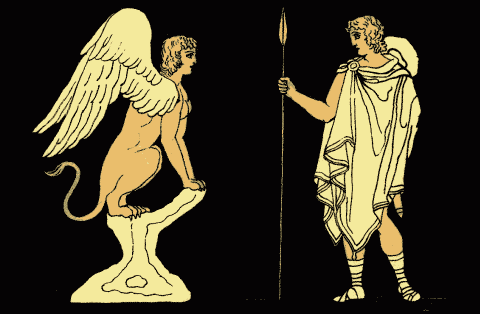
(If you're interested in reading Sophocles' version, click here; it's probably worth noting that my ludization of the tragedy originates in my own highly contentious reading of its plot and themes. Above all, I believe that the Athenian audience would have recognized that Creon is in fact attempting to seize the throne from Oedipus.)
The game begins with a fade in from a screen upon which appear only the words “You are a citizen of Thebes. A man named Oedipus is now the king of your city. Almost everyone in the city has been infected by a plague, and no one knows why.”
The player’s character is indeed a citizen of Thebes, in the time of a terrible plague. At the start of the game, he or she can choose to go with a mass of other citizens to the house of Oedipus, tyrant of Thebes, or simply to explore the city. The gates of the city are closed and under quarantine, but, other than that spatial limit, and the increasing percentage chance that the player character will be infected with the plague and grow gradually weaker, at last becoming immobilized with the disease until the resolution of the story finally frees him to lead a perfectly uninteresting but potentially endless life in the city, he can go to a large variety of ordinary places and do a large variety of ordinary things.
On the other hand, if the player chooses to follow the crowd, he or she may become involved in the story of Oedipus’ attempt to solve the mystery of the murder of his predecessor—and, it will turn out, father—, Laius. The player is able to question a large variety of NPC’s along elaborate dialogue trees—trees so elaborate that it is practically impossible to exhaust them (and the player is told as explicitly as possible that he or she should NOT try; indeed, NPC’s eventually refuse to keep talking if the player seems intent on exhausting the dialogue; moreover, talking too long to NPC’s will cause the player to miss parts of the ongoing story); pieces of dialogue are frequently enhanced by brief cutscenes that illustrate the back-story; these, and the final cutscene of the game, are the only traditional cutscenes.
The rest of the story plays out in real-time, whether the player character is there or not; it is occasionally difficult for the player to find the location of the story-action.
The player’s only task in the game—and this task is hidden from the player until he or she uncovers evidence of the conspiracy against the tyrant—is either a) to convince Oedipus that he is not guilty of the murder of Laius, by discovering the crucial pieces of information necessary, and thus to become the trusted advisor of what remains of him after the story’s disaster, or b) to join with the conspirators and bring him or herself into power along with Creon and Teiresias. That is, the main quest is simply to bring the story to its conclusion, by interfering in it effectually. Doing so brings a cutscene contextualizing the story, and then the credits.
It is more than possible—in fact it is easy—to avoid participating in the action of the game completely. The action unfolds over a game time-frame of approximately 10 hours. Progress-saving checkpoints occur only when the player has completed a piece of the story—something that must be done on the game’s internal schedule. Returning to the last checkpoint is at the discretion of the player; when he or she does, he or she is then free to attempt to continue with the story, or to wander off its path again.
With only a little bit of work on the main quest, however, it becomes clear to the player that something is wrong with the case mounting against Oedipus. From that point on, the game is a gradual but very fast-paced build towards the decision of whether Oedipus is in fact worth saving, and how to go about saving him. It turns out that there is no way to prevent Jocasta from committing suicide or Oedipus from blinding himself, but that bribing the herdsman and/or Teiresias (who, it turns out, have been bribed already by Creon) precipitates a scene in which Oedipus is shown the ultimate horror: the folly of his self-conviction.
If the player does not accomplish this bribery, he or she may instead go to Creon and threaten to expose his treachery, in which case Creon introduces the player as the new second-in-command of Thebes at the close of the action, as Oedipus is herded back inside the palace blind and polluted. If the player is watching, he or she will also see Creon talking to Teiresias, obviously planning the player-character’s downfall.
The central idea of this game might be called “tragedy by other means”—that is, in sketching it out I’ve attempted to create the opportunity for the player to experience tragic identification with Oedipus. I have no idea whether anyone but me would ever want to play it, of course. Above all, I want to thank Corvus for the topic!
